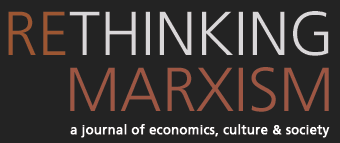Association for Economic and Social Analysis (AESA)
I. AESA’s purpose is to stimulate interest in, and debate over, the explanatory power and social consequences of non-essentialist Marxian economic, cultural, political, and social analyses in order both to interpret and change the world.
II. AESA recognizes that Marxism is a formation shaped by historical and contemporary processes, incorporating political, social, economic, cultural, natural, and intellectual dimensions. AESA seeks to articulate Marxism as a condensation of these processes into a concept of ‘class’, and presents this articulation in an open-ended way to reflect on its conditions of possibility. This emphasis emerges from a non-essentialist, overdeterminist Marxism influenced, in particular, by the work of Althusser.
AESA’s particular articulation of Marxian class analysis began in the Economics department of the University of Massachusetts, Amherst, and has since proliferated via the innovative work of researchers around the world. It now encompasses varied research traditions, such as those that examine the relation of class to subjectivity, gender and race and their intersections with other axes of power and difference, community economies, psychoanalysis, private lives, ecology, and more.
III. AESA encourages contributions from people in many disciplines and from a wide range of intellectual, political/activist, and artistic perspectives – including both academic and non-academic projects. Notably, AESA remains committed to producing the journal Rethinking Marxism: a journal of economics, culture, and society, and undertaking additional public activities such as conferences – both national and international – that expand the work of the organization.
Ongoing Activities
Rethinking Marxism: A Journal of Economics, Culture and Society
Since 1988, AESA has sponsored the publication of Rethinking Marxism (RM). RM is a quarterly journal, and each issue contains full-length scholarly articles, art (including photo-essays and fiction), Remarx essays (short, current pieces that intervene in political and theoretical debates), reviews (of books, films, conferences, exhibits, demonstrations, and more), and correspondence. It also publishes special issues, mini-symposia, virtual issues, interviews, and the ‘Keywords’ series (short pieces reflecting on foundational concepts in Marxist thought).
International Conferences
Approximately every 4 years, AESA sponsors an international conference at the University of Massachusetts-Amherst. Plenary speakers have included David Harvey, Mike Davis, Gayatri C. Spivak, Angela Davis, Sheila Rowbotham, Ernest Mandel, Judith Butler, Cornel West, and Etienne Balibar.
In addition, since 1982, AESA has sponsored occasional smaller-sized conferences. Speakers have included Fredric Jameson, Martha Rosler, Arturo Escobar, Michael Eric Dyson, Cindy Patton, and Anwar Shaikh.
A list of previous conferences can be found here.
AESA Board of Directors
- George DeMartino: President
- Jonathan Diskin: Treasurer
- Anastasia Wilson: Clerk
- Dan Skinner
- David Kristjanson-Gural
- Shahram Azhar
- Taimoor Shaukat Malik
Selected Books by AESA Members:
- Bringing It All Back Home: Class, Gender, and Power in the Modern Household (Harriet Fraad, Stephen Resnick, and Richard Wolff)
- The Falling Rate of Profit: Recasting the Marxian Debate (Stephen Cullenberg)
- Knowledge and Class: A Marxian Critique of Political Economy (Stephen Resnick and Richard Wolff)
- The End of Capitalism (As We Knew It): A Feminist Critique of Political Economy (J. K. Gibson-Graham)
- Global Economy, Global Justice: Theoretical Objections and Policy Alternatives to Neoliberalism (George DeMartino)
- Class and Its Others (J. K. Gibson-Graham, Stephen Resnick, and Richard Wolff)
- Contending Economic Theories: Neoclassical, Keynesian and Marxian (Stephen Resnick and Richard Wolff)
- Development and Globalization: A Marxian Class Analysis (David Ruccio)
- Postmodern Materialism and the Future of Marxist Theory: Essays in the Althusserian Tradition (Antonio Callari and David F. Ruccio)
- Marxism in the Postmodern Age: Confronting the New World Order (Antonio Callari, Stephen Cullenberg, and Carole Biewener)
- Representing Class: Essays in Postmodern Political Economy (J. K. Gibson-Graham, Stephen Resnick, and Richard Wolff)
- Economic Representations: Academic and Everyday (David Ruccio)
- Postmodern Moments in Modern Economics (David Ruccio and Jack Amariglio)
- Marxian Economics: An Introduction (David Ruccio)
- Knowledge, Class, and Economics: Marxism Without Guarantees (Richard McIntyre, Robert Garnett Jr., and Theodore Burczak)
- Late Neoclassical Economics: The Restoration of Theoretical Humanism in Contemporary Economic Theory (Yahya Madra)
